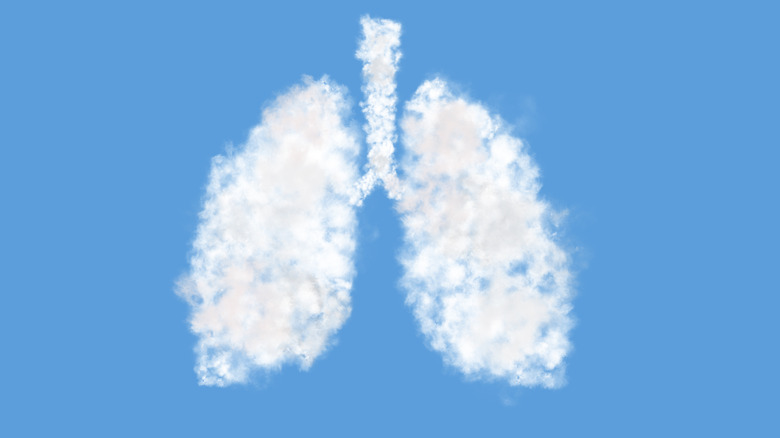Is Secondhand Cannabis Smoke As Bad As Secondhand Cigarette Smoke?
As state after state legalizes marijuana for medicinal or recreational use, more Americans are smoking cannabis than ever before. In fact, according to the U.S. Department of Health and Human Services, the use of marijuana is growing among all adult age groups and both sexes and the perceived risks associated with it are declining. While cannabis has shown it can provide relief for those with issues like chronic pain, nausea associated with chemotherapy, and multiple sclerosis (via National Center for Biotechnology Information), the dangers associated with its use — including harm to the lungs from daily smoking — are still a matter of concern to scientists.
According to the National Institute on Drug Abuse, marijuana smoke is an irritant to the throat and lungs and contains volatile chemicals similar to those found in cigarette smoke that may raise the risk of cancer and lung disease. Besides the risks to the cigarette smokers themselves, secondhand smoke has been found to pose risks to those that are in the same household or share space with regular smokers. According to the CDC, secondhand cigarette smoke can cause everything from heart disease to lung cancer in adults and pose even more risks to children and pregnant women. New research points to the potential for secondhand marijuana smoke to be as dangerous as secondhand cigarette smoke.
Secondhand cannabis smoke may be putting households at risk
According to a recent research letter published in the JAMA Network Open, cannabis bong smoking in the home showed an increase in fine particulate matter (including toxic chemicals and carcinogens) in the air from 100-fold to 1000-fold, depending on the length of the smoking session. Even more worrisome, the researchers found that compared to cigarette smoking, cannabis smoking generated four times higher concentrations of this fine particulate matter and even 12 hours after a smoking session ended, particulate levels in the air remained 10 times higher than normal.
While there is no definitive data on the harmful effects of secondhand cannabis smoking on the lungs, the American Lung Association suggests smoke in any form is harmful to lung health. Cannabis smoke also contains psychoactive compounds, however, it's unlikely one will feel high if they're inhaling secondhand smoke, according to the National Institute of Drug Abuse. For cannabis smokers living with non-smokers and others who may be at risk from secondhand marijuana smoke, smoking outdoors instead of in the house or trying other consumption methods like edibles may be worth considering.


